|
|
|
Sort Order |
|
|
|
Items / Page
|
|
|
|
|
|
|
| Srl | Item |
| 1 |
ID:
124780
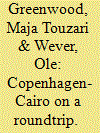

|
|
|
|
|
| Publication |
2013.
|
| Summary/Abstract |
Although securitization theory has been applied worldwide, it has been accused of having only limited appositeness to the non-Western world. When the Centre for Advanced Security Theory began a collaboration with the Danish-Egyptian Dialogue Institute and the Al-Ahram Centre for Political and Strategic Studies in Cairo in 2010, securitization theory was challenged on two levels: both through its employment to analyse and act politically in a Middle Eastern context, and through the attempt to do so during and after the Arab Spring, when the entire Egyptian security sector was being re-evaluated. These unique circumstances prompted reflections on the use of non-traditional and traditional security concepts, on how the Egyptian revolution could be understood through securitization theory, and on what the experiences of this project might mean for further theory development. This article discusses these points in the light of the Danish delegation's experiences.
|
|
|
|
|
|
|
|
|
|
|
|
|
|
|
|
| 2 |
ID:
124776
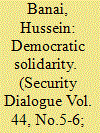

|
|
|
|
|
| Publication |
2013.
|
| Summary/Abstract |
This article aims to temper the cross-disciplinary enthusiasm for democracy-promotion programs in the light of the recent anti-authoritarian upheavals in the Middle East. It offers a wide-ranging critique of mainstream instrumentalist arguments (i.e. that democracy leads to peace, development, and justice), which are hampered by universalist generalizations about democratic government - in other words, by a tendency to separate democratic values and institutions from their orientation within particular political and historical contexts. In the place of such arguments, it offers an alternative model of democratic solidarity premised on the belief that the social construction of democratic norms - and especially the reflective processes that mediate their internalization - has a direct bearing on the legitimacy of political forms and decisions. Through a detailed analysis of the trials and tribulations of US democracy-promotion programs in the Arab and Muslim world, it further argues that the provision of any outside assistance to democratic transitions in the Middle East will need to involve the twin tasks of understanding the quite complex and contextual struggle for rights and freedoms in each particular society, and providing the necessary space and resources for achieving democratic legitimacy.
|
|
|
|
|
|
|
|
|
|
|
|
|
|
|
|
| 3 |
ID:
124778
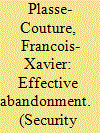

|
|
|
|
|
| Publication |
2013.
|
| Summary/Abstract |
Towards the end of 2012, a group of Israeli settlers and right-wing activists attacked an Israel Defense Forces (IDF) base on the West Bank. IDF soldiers and members of the Israeli Knesset had provided information to the attackers, who adopted a 'bring it on' tone that commentators described as echoing 'civil war'. As the occupation blurs the categories of inside/outside, what we are witnessing is a challenge to the traditional distinction between politics and war. Accordingly, we are moved to think in terms of the distribution and variable intensities of violence, rather than to accept simple debates about either the absence or presence of war or the monopoly of violence. This article seeks to examine the evolving relationship between the state and society in the wake of the so-called Arab Spring through an investigation of the relationship between neoliberalism and sovereign violence. It argues that 'price tag' actions perpetrated in the Occupied Territories and Israel are the effect of a neoliberal organization of power characterized by a form of governing by non-intervention, where the abandonment of certain parts of society produces the desired containment of elements considered undesirable to the body politic. This article challenges Weber's theory of state sovereignty as the monopoly of legitimate state violence, arguing instead that state apparatuses may in fact 'outsource' violence. We can understand this shift in the mode of operation of sovereignty by theorizing 'society' as the effect of warlike relations whereby particular tactics and strategies are employed as a way of organizing and policing forms of life necessary for the continuation of a particular body politic.
|
|
|
|
|
|
|
|
|
|
|
|
|
|
|
|
| 4 |
ID:
124781


|
|
|
|
|
| Publication |
2013.
|
| Summary/Abstract |
This article uses the theoretical framework of securitization in order to analyse the concurrent developments of, on the one hand, the Arab Spring and the resulting ascendance of a New Middle East and North Africa and, on the other, the discovery of natural gas resources by a number of states in the region. Furthermore, we use these developments as tests of the theory, in the process highlighting a number of criticisms that have been levelled against securitization and that are exemplified by these recent empirical events. We examine the outcomes of the Arab Spring as a process of contestation and as an avenue for the promotion of alternative discourses through the emergence of new political actors, institutions and state relations in the region. At the same time, we identify the underexploration of energy securitization in the literature and the need for a cross-sectoral approach for the referent object of energy in the widened security agenda. Ultimately, the article presents the argument that each of the two sets of developments affects the other, thereby transforming the environment within which securitization and desecuritization may result.
|
|
|
|
|
|
|
|
|
|
|
|
|
|
|
|
| 5 |
ID:
124775
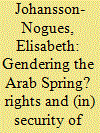

|
|
|
|
|
| Publication |
2013.
|
| Summary/Abstract |
During the anti-regime uprisings in Tunisia, Egypt and Libya, women from all walks of life were as ready as men to take to the streets to protest against the ineptitude and transgressions of their countries' governments. Their courage was particularly noteworthy given that they suffered not only the violence of the regimes' attempts to suppress protests by force, as did their male counterparts, but also a systematic targeting by security forces who attempted to break the women's spirits through attacks on their honour and bodily integrity. The female presence and agency in the Arab Spring encouraged activists in Tunisia, Egypt and Libya to expect an equitable role for women in the political transition processes that followed the fall of the authoritarian regimes in those countries. However, the female input in those political transitions has been scant. Moreover, in all three countries, established women's rights are increasingly under attack and violence against women is on the rise. This article applies a gendered perspective to explore the upheavals of the Arab Spring and the political transitions in the three countries, and inquires into the insecurities that women have suffered since early 2011.
|
|
|
|
|
|
|
|
|
|
|
|
|
|
|
|
| 6 |
ID:
124779


|
|
|
|
|
| Publication |
2013.
|
| Summary/Abstract |
The UN Special Tribunal for Lebanon (STL), which was set up through UN Security Council Resolution 1757 to investigate, indict and prosecute those responsible for the 2005 assassination of former Lebanese prime minister Rafik al-Hariri, is advancing a series of regional and global geopolitical interests. We focus on the structure of the tribunal and its exceptional nature within international law, examining the extent to which the STL's so-called unique features and the process through which it emerged expose its role in representing the interests of regional and global geopolitical actors, effectively internationalizing both the prosecution of the assassination and the issue of Hezbollah's disarmament within the discourse of the 'war on terror'. We also take up the question of Lebanese sovereignty and the extent to which the STL shifts between challenging and altogether disregarding this issue in a manner not unusual in the context of historical trends within international law justifying the colonial tendencies of great powers. We contextualize the STL within broader trajectories in international law, with specific reference to Carl Schmitt's 'challenge of imperial conquest and land acquisition', such as exceptionalism and the colonial genealogy of international law. We then discuss the extent to which the STL enunciates the geopolitical interests of powerful regional and global actors, unpacking the so-called unique features of the STL that reflect its exceptional character. Throughout our analysis, we argue that the STL and its manifestation of contemporary discourses of insecurity play a highly significant role in the international disregard for Lebanese sovereignty and the delegitimization of most domestic political actors, including Hezbollah.
|
|
|
|
|
|
|
|
|
|
|
|
|
|
|
|
| 7 |
ID:
124777
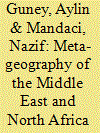

|
|
|
|
|
| Publication |
2013.
|
| Summary/Abstract |
This article critically analyses Turkish security discourses connected to the meta-geography of the Broader Middle East and North Africa (BMENA) before and after the developments of the Arab Spring. A critical geopolitics approach and critical security theories in international relations provide the theoretical framework, as security discourses are considered to be a product of geopolitical imaginations and codes that, in turn, shape the making of foreign and security policies. First, the article examines the invention of BMENA as a meta-geography within Turkey's new geopolitical imagination, as well as the new geopolitical codes underlying the new security discourses. Then, the article assesses the impact of the Arab Spring, which led to major changes in Turkey's newly established geopolitical codes, formulated in the pre-Arab Spring period, and analyses the ruptures and continuities in Turkey's security discourses in the light of those developments. Finally, the article concludes that the Arab Spring, especially the Syrian crisis, shifted the focus of Turkey's foreign policy in BMENA from cooperation to conflict. This has led to a resecuritization of Turkey's geopolitical codes, discourses and security practices in the region, revealing the limitation of Turkey's current geopolitical imagination.
|
|
|
|
|
|
|
|
|
|
|
|
|
|
|
|
| 8 |
ID:
124773
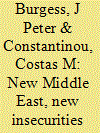

|
|
|
|
|
| Publication |
2013.
|
| Summary/Abstract |
The recent uprisings in the Middle East have highlighted - once again and in dramatic fashion - the confluence of understandings of security, representations of danger and practices of legitimation that shape our variegated geopolitical landscape. The political landscape of the Middle East is changing, and with it many of the rote certainties about how things are done or ought to be done in and with the region. Local regimes of power can no longer justify to national constituencies and international audiences the necessity of autocratic rule, states of emergency and suspension of rights. 'The West' confronts the hypocrisies and moral discounts of its own foreign policy choices, including how its definition of regional security supported the kinds of regimes, policies and human rights violations that Western states traditionally define themselves against.
|
|
|
|
|
|
|
|
|
|
|
|
|
|
|
|
| 9 |
ID:
124774


|
|
|
|
|
| Publication |
2013.
|
| Summary/Abstract |
In the wake of the recent Arab revolutions, the European Union (EU) has sought to provide genuine and substantial support to a range of Arab social movements in the region's emerging polities. Yet the EU's recent democracy-promotion efforts represent a puzzle for earlier critical approaches to the relationship between Europe and the Middle East and North Africa (MENA), which argue for the existence of hegemonic patronage linkages. We argue, however, that the EU's attempts at democracy promotion in the MENA region may be understood through a governmentality framework, despite the limitations of such an approach. Specifically, the EU is actively promoting neoliberal policies in the aftermath of the Arab Spring in order to foster a mode of subjectivity that is conducive to the EU's own norms and interests. What we observe are not just innocent attempts at democracy promotion, but a form of politics and economics that seeks to subject the agency on the 'Arab street' to EU standards. We conclude by going over the radical plurality of the Arab street, and show how it was in fact earlier neoliberal reforms by their former regimes that created the conditions of possibility for the recent revolutions in Tunisia and Egypt.
|
|
|
|
|
|
|
|
|
|
|
|
|
|
|
|
|
|
|
|
|